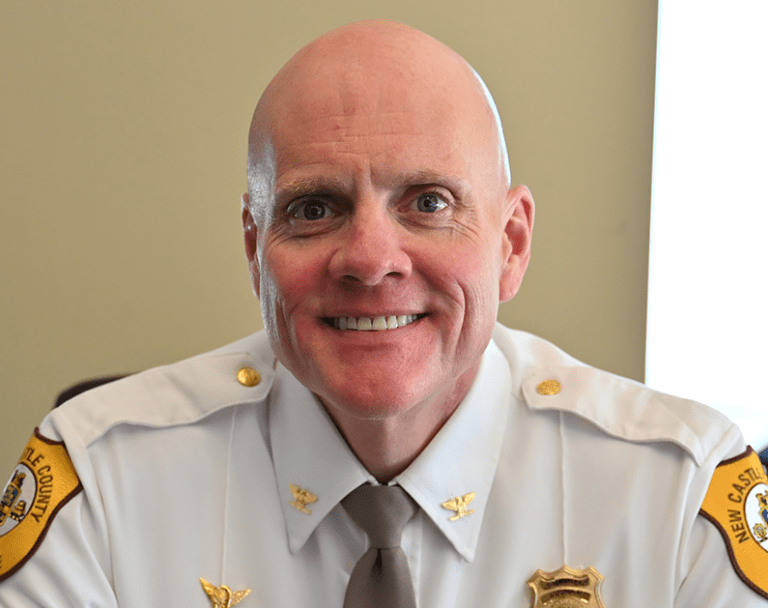Alumni Spotlight: James (Jamie) Leonard III ‘02 Appointed Chief of Police for New Castle County Division of Police

After nearly two decades of service in law enforcement, Jamie Leonard ‘02 was named the new chief of police for New Castle County and promoted to colonel.
In January 2025, Col. James (Jamie) Leonard III ‘02 became the chief of police for the New Castle County Division of Police in Delaware and was promoted from captain to colonel. Known for being Delaware’s second-largest police department, the New Castle County Police Department has an authorized strength of 400 and a civilian workforce of 100.
A third-generation police officer with twenty years of experience, Leonard has stepped into the new position determined to improve the department and make the county a safer environment for its residents.
“The opportunity I’ve been given is actually to build out an executive staff that’s picked by me that’s aligned with the vision that I see for the organization,” Leonard said, “[has] been one…blessing that I have in this.”
Following a Family Calling
Leonard grew up in Delaware but found himself looking for schools in Pennsylvania when it was time for college. He had a friend who applied to York College of Pennsylvania, and after the two of them visited together, Leonard fell in love with the campus and made his decision.
For his first two years, Leonard followed a pre-med track. He wasn’t completely happy with this path, though, feeling as if he were fighting his life’s calling, as both of his parents and grandfather were retired police officers. Eventually, Leonard decided to transition most of his classes to criminal justice and accounting.
“[With] the way that federal law enforcement works,” Leonard said, “a criminal justice degree doesn’t cut it to get accepted to, say, the FBI. They want an accounting degree or something like that, so I reshuffled my entire curriculum back to law enforcement-centered, but with an accounting focus as well in the event that I wanted to go into federal law enforcement.”
When reflecting on meaningful experiences, Leonard mentioned that his classes with former York College professor Gary Willis greatly impacted him, making the academic portion of the profession interesting.
“They were deep-dive conversations about constitutional law and modern policing at the time, and all of those have formed a solid foundation in me,” Leonard said. “Just the way the messaging was delivered by him and how it was done—the passion with which he talked about it and the connections he had with the students were second to none. It really drove home to me that I was making the right decision.”
Overall, Leonard expressed having a great experience at York College, saying that “to see its growth makes me really proud.”
Journey to Chief of Police
Leonard graduated from York College in 2002 with a Bachelor’s Degree in Criminal Justice.
He spent his summer working as a seasonal police officer at Rehoboth Beach, DE, the same police department as his parents and grandfather. In November 2002, Leonard entered the police academy and graduated in May 2003. He joined the New Castle County Police Department right after.
Leonard started his career as a patrol officer for five years and another five in the detective division. He was then transferred to the homicide unit and worked there until 2013, when he was promoted to and held the title of patrol sergeant for four years. He then ran the computer crimes unit and acted as supervisor of the child abuse unit.
He became a lieutenant and ran a patrol squad during the COVID-19 pandemic for four years. At the same time, he ran and was elected as President of the State Fraternal Order of Police (FOP), which was the labor union for law enforcement in Delaware. He would remain in that position until his appointment as chief of police in January 2025.
Initiatives for Change
Leonard’s promotion coincided with changes within the executive staff. With a few recent openings, Leonard now has the opportunity to build a team that will help him achieve the changes and plans he has for the department.
Leonard is mainly looking to address the major reductions in recruitment numbers across the profession, leading to a massive attrition problem within law enforcement. Currently, the New Castle County Police Department is about 70 people short of its authorized strength, so Leonard is committed to returning the numbers to around 415. This isn’t a situation unique to Delaware—it’s been an issue for law enforcement everywhere. Many say the events in 2020 contributed to this.
“It has taken a bit of time to rebrand it and rebuild it back to the position that it was in as community partners, as opposed to almost an authoritarian force,” Leonard said. “But we’re seeing exponential growth in that, so that’s one of the things that I’m excited about because we’re finally seeing numbers that will get us back to our authorized strength and grow our department pretty rapidly, which affords us an opportunity to engage in new initiatives.”
One of his biggest goals is to reinstate community engagement units initially shut down due to shortages. He hopes the police department will be able to do more work to connect within school systems to try and reach at-risk youth at a younger age.
He also wishes to put people back on foot patrol in high-crime or high-risk areas where crime is disproportionate to other county areas and to build a sizable community engagement unit that partners with the communities it serves.
“We had the first co-responder mental health units in Delaware, and we still are on the cutting edge of that,” Leonard said. “We currently serve as a mentor site for departments across the country, trying to set up mental health and co-responder addiction support units.”
It is Leonard’s hope that eventually, they will be able to provide resources and programs that will help and support anyone within the community struggling with mental health or substance abuse without the need for law enforcement intervention. He also wishes to see an improvement in technology use, such as using drones as first responders and securing funding to increase data sharing with their partner agencies.
Impact of the Past
Leonard expressed that York College greatly impacted him and the person he became. Though the familiarity of the smaller size of the school initially drew him in, Leonard found many echoes of the close-knit community of the college in his workplace.
“There’s a lot of collaborative thinking and that’s what you saw within the college,” Leonard said, “and it was one of the largest reasons I chose it - the proximity to my home, but also being far enough away…So the transition wasn’t as aggressive. And again, that’s what we’re seeing here because we’re having meetings, we’re having discussions with people on a smaller scale, hearing them out, finding out what’s important to them, and changing the direction of the department.”
“But all of that foundation is built through the education that I have received both here and at York [College].”
Leonard cited that his biggest supporters are definitely his family, especially his wife and kids. His parents, who were both in law enforcement, also had a major impact on the person he became and helped guide him to the path he is on now. The same goes for the friends he made at college and the mentors he found during his time in law enforcement.
“I’ve had a unique opportunity because of my union job to have some of the best mentors…throughout Delaware and throughout the region,” Leonard said. “My family and the friend group I have both from York [College] and my high school have been foundational [to me] as a person. Then, in the profession, because each of us walks different walks of life, the perspective that they give is always good to see things from other people’s point of view.
“It’s no secret that law enforcement can be seen as relatively stubborn and close-minded. But when you take time to hang out with people outside of just law enforcement, you hear the different perspectives, and the friend group that I have is super helpful with that.”
Always Think Ahead
Leonard reminds those interested in joining law enforcement to always be aware of their decisions, which should reflect good character and the kind of person who will help change and protect their community for the better.
“Be cognizant of the decisions you make, even in the early parts of your time, because they could have direct impacts on your ability to serve within law enforcement,” Leonard said.
Any position within law enforcement comes with a great deal of responsibility, and according to Leonard, empathy for the people you are protecting is a must. Even if faced with difficult situations, remembering your values and why you are serving in the first place can give any candidate the potential to make a meaningful impact on the world.
“Come at law enforcement with the sole goal in mind of making the community that you’re going to serve a better place than what it was when you found it,” Leonard said. “If you keep that at the core of your being, then you’ll be successful within this profession.”




